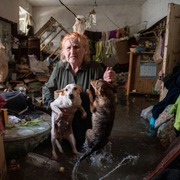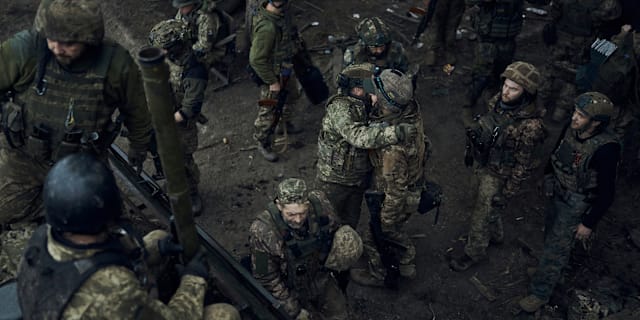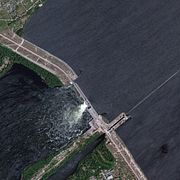Satellite images of the dam in Kherson. AP
Analysis: Key strategic target - has been warned of apocalyptic consequences
The dam on the Dnipro river in Kherson has been of great strategic importance ever since Russia invaded Ukraine in February 2022, writes Sky News Ukraine correspondent Alex Crawford in an analysis. The dam, which holds as much water as the Great Salt Lake in Utah, USA, supplies dozens of villages and towns in the area with both water and energy.
Additionally, Crawford writes, it has long been considered a possible military target because of the devastation an attack would bring. Ukrainian President Volodymyr Zelenskyi has previously spoken in "apocalyptic terms" that a dam collapse would result in a large-scale disaster.
Ekot's Russia correspondent Maria Persson-Löfgren says in a live broadcast that 20,000 residents in the area are threatened by floods as a result of the collapse. She also states that the dam cannot be repaired and that the water cannot be stopped.
Hugues Maillot writes in an analysis in Le Figaro that the destruction in Kherson could pose a risk to the nuclear power plant in Zaporizhzhya, which is located approximately 20 miles upstream from the dam. The reason is that the facility takes its cooling water from the reservoir. Maillot notes, however, that experts at the International Atomic Energy Agency have come out and said that there is no immediate danger to the nuclear power plant.
Photos from the collapse and Zelenskyi in a meeting after the event. TT/AP
Russian invasion The dam collapse in Kakhovka
As much water as Mälaren – we know this about the dam roof in Kakhovka
After an explosion early Tuesday morning, the huge and strategically important power plant dam in Kakhovka in southern Ukraine collapsed. Huge amounts of water were flushed out and flooded several communities in the area, forcing thousands of people to leave their homes immediately.
The dam is located on the Dnipro River near the front line of the war in the Kherson region, which is largely controlled by Russia. Several media outlets have tried to sort out what we know - and don't know - about the catastrophic attack:
Who is behind the incident?
Russia and Ukraine accuse each other of causing an explosion that led to the collapse of the dam, but without presenting any evidence.
Ukrainian President Volodymyr Zelenskyy claims that "Russian terrorists" are to blame for the collapse. Kremlin spokesman Dmitry Peskov claims for his part that it is a "sabotage attack" by Ukrainian forces.
Independent parties have not been able to establish how it actually is.
Ukrainian soldiers. Archive image. Libkos / AP
The Russian Invasion|Voices of the War
Analysis: The counteroffensive can be hampered by the dust attack
Russia
and Ukraine accuse each other of being behind the attack that caused
the devastating collapse of the Kakhovka power plant dam. But which side can benefit most militarily from the massive damage? That's what the BBC's Frank Gardner asks in an analysis.
On
the one hand, he writes, the major floods set things right for the
Russians, who now have to evacuate both troops and civilians eastward. In addition, the dam is responsible for the water supply of the Russian-occupied Crimean peninsula.
But
the attack must also be seen in a larger perspective, more specifically
in light of Ukraine's expected major counteroffensive, Gardner points
out. Ukrainian forces need to find a way to isolate Crimea to achieve significant success. If
they manage to break through the Russian defense lines south of
Zaporizhzhya and divide the area, they could achieve a major strategic
victory, according to Gardner.
"But this attack, whoever is behind it, now makes this option much more problematic," he writes.
At
the same time, Matthias Williams writes in Reuters that it is likely
that Russia benefits the most from this, given that they are currently
on the defensive. The
flooding in the region will prevent the use of heavy weapons such as
tanks for at least a month, experts Williams spoke to said.
analysis Frank Gardner: Who benefits most from destroying the dam?



Inga kommentarer:
Skicka en kommentar